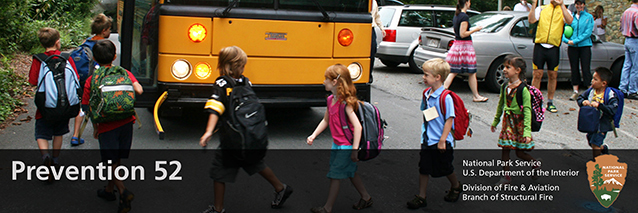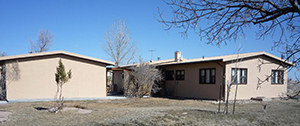

It's school time again, and with that comes back-to-school activities, such as shopping for school supplies, packing backpacks, and meeting and greeting new teachers. Of all the chores that need to be accomplished before the first day of school, I bet few parents have "review fire safety" on their back-to-school to-do list. However, many older children in our communities and park housing areas will return home at the end of each school day to an empty house, until their parents come home from work. Knowing how to keep themselves and their siblings fire safe is a great task to add to the to-do list.
Introducing or reviewing fire safety guidelines with your children is just as important as their class schedules and locker combinations. Children up to age 14 make up 15% of all fire-related deaths in the United States. If your children are mature enough to stay home alone, they need the knowledge of how to prevent fires or survive a fire, if one should occur.
Consider the following to keep your child fire safe after school:
- Will your child have a reliable phone to use in an emergency? Cordless phones will not work in a power outage. Cell phones do not alert emergency services to your home address. It's best to have a landline or a charged cell phone to use during a power outage and make sure your child can recite his or her home address.
- Is there a list of emergency numbers and contact information on your refrigerator or at each telephone in your home? List all the numbers a child can use to reach you, including your cell, direct business line, and main office number. Include a neighbor's phone number, the local emergency number, and the number to poison control.
- Do you have fire extinguishers on every level of your home, especially in your kitchen and garage? Do you want your child to know how to use them or do you just want him to leave the house immediately if a fire occurs? Plan accordingly and share the plan based on your decision.
- Have you developed a home fire escape plan for your family? Have you practiced it, and does your child know where the meeting place is in the event of a fire (e.g., a neighbor's house, by the tree in the front yard)? Are there two ways out of every room in the house?
- Are smoke alarms properly installed in the house and are the batteries changed every six months? Does your child know what the alarm sounds like and what to do if the alarm rings?
- Does your child have snacks readily available that do not need to be heated or cooked? If you let your kids use the microwave after school, do they know which buttons to use?
A little advance preparation to ensure your child is protected from harm during a structural fire will definitely lead to a great school year.
Fire Info for You
Employees
Share some of these lessons with your child:
- Have your child check in with you when he arrives home after school.
- Teach your child not to play with matches, lighters, and fire. Keep those items in a locked cabinet or drawer, away from curious minds.
- Tell your child not to hide from firefighters and to exit the house quickly in a fire. Many children hide under beds and in closets, thinking it will keep them safe.
- Demonstrate the technique of stop, drop to the ground, and roll, to be used if their clothes catch fire.
- Teach your child what to do if they smell gas (i.e., propane or methane) in the house.
- Show your child how to crawl low on the floor, below the smoke, and get out of the house in a fire. Teach them to use the back of their hand to test if a door is hot, before it's opened, and choose another exit, if needed.
Firefighters/Park Leadership
Offer an interactive fire safety course to children in park housing and cover after school fire safety and prevention techniques.
Take Action
aside some fire prevention time with your children to make sure they have the proper knowledge and tools to keep themselves safe from fire while you're at work.
NPS Fire Facts
Many families live in national park housing and children do stay home alone after school, while their parents finish out the work day. As parents, we often have a false sense of security, when our kids are home alone, thinking that we're just working across the street or down the road at the visitor center. Be ever vigilant of your children, even when you're working close to your residence.
Years ago in a national park, a few siblings were left home alone under the care of an older sibling while their parents worked for the park's concession operation. Unfortunately, one of the children was playing with a lighter in the back bedroom. Despite the older sibling's attempts at getting the child to stop playing with fire, a fire started in the house. Sadly, two children died in the blaze. No one wants to come home or be called to such a disaster.
Last updated: November 2, 2016
